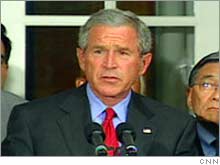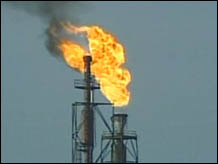 |
| President Bush called for more refineries Tuesday to help bring down gas prices. He also spoke on the search for a new head of the Federal Reserve and said he'll keep his push to reform Social Security alive. |
|
|
|
|
|
|
|
|
|
|
|

|
| Jim Gillingham of Valero Energy Corp. talks about getting a damaged refinery back in production. (October 3) |
Play video
|
|
|
|
NEW YORK (CNN/Money) -
President Bush called Tuesday for the construction of new refineries to help alleviate the recent record high gas prices, and said any person he chooses as the next head of the Federal Reserve will be independent from politics.
Speaking at a press conference at the White House, Bush asked Congress to send a bill to his desk that allows refineries to expand and new refineries to be built.
"It ought to be clear to everybody that this country needs to build more refining capacity to be able to deal with the issues of tight supply," he said.
Easing the regulations on refinery construction has been part of Bush's energy plan for the last several months. He noted that a new refinery hasn't been built in the country since the 1970s.
Crude oil has reached record prices over the last several months, driven by soaring worldwide demand and a belief that easily extractable oil reserves are nearing or past their peak production years.
That has translated into higher prices for refined products such as gasoline and heating oil. Prices went higher yet following hurricanes in the Gulf of Mexico that knocked out key oil refineries and stretched an already overburdened worldwide refinery system.
Bush didn't give any names as to who will replace current Federal Reserve Chairman Alan Greenspan when he retires in January 2006, but he said it will be important the person is independent from politics.
"It's this independence of the Fed that gives people, not only here in America but the world, confidence," he said.
Bush said he would consult both inside and outside the White House to solicit opinions on Greenspan's successor.
"I personally haven't seen any names yet," Bush said. "I'll name the person at an appropriate time."
Greenspan has become something of a legend in the financial world, heading the Fed for the last 18 years during a period of mild inflation, mild recessions and the country's longest economic boom. There is widespread interest in his successor.
Candidates mentioned for the job include Martin Feldstein of Harvard University, Glenn Hubbard, a former head of Bush's Council of Economic Advisors, Ben Bernanke, who left the Fed to head the CEA earlier this year and former Bush adviser Lawrence Lindsey.
Responding to a comment from a reporter who said the president has presided over the largest increase in size, power and cost of the federal government since Lyndon Johnson, Bush said he'd like to remind the American people that the country is at war.
"I have pledged the American people -- and more importantly, the troops and their families -- we'll make sure they have what it takes to succeed," he said.
Bush said his current budget reduces discretionary non-defense spending and that he has proposed $187 billion in cuts over the next ten years in mandatory spending.
But he said Social Security is looming over the federal budget, and that he intends to continue to push for reform.
"It's an issue that's not going to go away and I'll continue to talk about it," he said "There seems to be a diminished appetite in the short term. But I'm going to remind people that there is a long-term issue that we must solve."
Earlier this year Bush proposed adding individual investment accounts to the Social Security system as a way to make it more solvent. He backed off the plan after it met with stiff opposition from Democrats and retirees, who claimed it would reduce benefits for the poor and that investment in the private sector was too risky.
The government's retirement program is expected to run into financial difficulty sometime between 2017 and 2041.
___________________________________________
Six months of more gasoline pain? Click here.
Bush agenda may still weather Katrina. Click here.

|